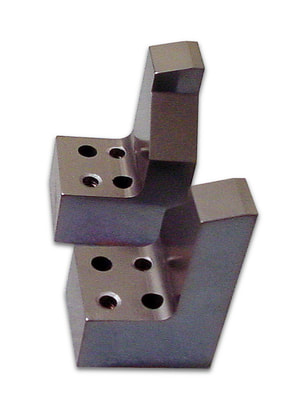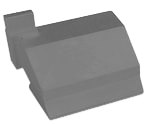Optimize Tool Performance with TiCN Coating!
Want two to four times the tool life over TiN? Try our titanium carbo-nitride (TiCN) PVD coating. Adding carbon to a TiN film increases the hardness nearly 80 percent, resulting in additional tool life.
TiCN is an excellent all-purpose coating, but does particularly well in punching, injection molding and cutting tool applications.
TiCN is easily stripped from common tool steels. This makes it ideal for those applications where you want maximum tool life, but also the ability to remove the coating when it wears through and reapply it.
TiCN can come in a range of colors, depending on the percentages of nitrogen and carbon in the film. Films that are high in nitrogen will be brownish, while those with a higher carbon percentage will be metallic or grey in color (TiC on the surface). Our current TiCN coating is grey (metallic) in color to provide better color consistency.

Properties:
Thickness: .0001″ – .0002″ (2 to 5 microns) on the working surfaces.
- There is some variation in coating thickness across tool surfaces. Edges collect more vapor, so they get more coating.
- Factors such as process parameters, tool geometry, tool location inside the vacuum chamber, etc., can all influence how thick the coating is on a particular area of the tool.
- It is possible to build up coating thickness by coating a part multiple times. As the coating gets thicker, there is a greater chance of spalling.
Hardness: 4200 – 4600 Hv (>80 Rc).
- This Vickers Hardness correlates to a hardness considerably above 80 Rc. (Rockwell C is not used above 80 Rc (1850 Hv)).
- Harder than carbide.
Inert and Stable – TiCN coating does not react with most materials and doesn’t begin to oxidize until about 700°F (375°C).
Biocompatible – TiCN coating does not react with tissue, blood, bones, or bodily fluids, making it suitable for medical, dental and food applications.
Coefficient of Friction (COF) is dependent on the type of material the coating is rubbing against; it is about 0.2 for steel alloys.
Deposition Temp. 700 – 800°F – We coat most parts at about 800°F (425°C). This temperature may adversely affect some materials. We recommend consulting with us, or your local heat treater, should you have any material concerns. This page provides additional information.
- Parts can be coated at lower temperatures, but this requires process modifications that can adversely affect coating properties such as adhesion and cycle time.
Appearance – variable, can range from orange to brown to bronze to metallic depending on the ratio of carbon and nitrogen in the film. The color of our standard TiCN film is metallic (TiC outer layer), although we also do a bronze color for some applications.
Adhesion – Excellent adhesion as long as substrates were properly cleaned and coating process properly executed.
Removing (Stripping) TiCN – This can be done chemically with little, to no, degradation to the tool surface, but only on steel alloys (stainless, tool steel, etc.).
- We cannot strip TiCN from carbide and some other materials because the chemical used attacks the cobalt binder or the substrate material.
- Stripping cost is approximately 40% of the coating cost.
Case History #1
Brazed Carbide Dovetail (TiN)
- Workpiece: 1018 Carbon Steel
- Shaving .001-.002”
- Results:
Uncoated: 15 Minutes Run Time
Coated: 8 Hours Run Time
Resharpened/Not Recoated: 2 Hrs Run Time; 3 Resharpenings
Resharpened & Recoated: 8 Hrs Run Time; 8 Resharpenings - Coating Cost; $8 – $16 per tool, depending on size

Benefits:
- All-Purpose coating
- Provides 2 – 4 x the tool life vs. TiN-coated tools.
- Biocompatible, used on many medical instruments and implantable devices.
Infinite Tool Life
TiCN and TiN can be easily removed from tool steels.
Our astute customers often remove tools from service before the substrate is worn, have the coating stripped and reapplied, thereby avoiding the cost of manufacturing new tools.
You too could make your tools last forever by using stripping and recoating to keep expensive tooling up and running.

Where To Use TiCN Coating:
Cutting Tools
- All-purpose coating that significantly improves tool life by 2 – 8x over uncoated tools and 2 – 4x over TiN-coated tools.
- Can be applied to all types of tools, including drills, taps, end mills, reamers, inserts, dovetails, etc.
- Materials that can be coated include HSS, M2, M4, T15, tool steels, carbide, stainless steels and other materials.
Punching and Forming Tools, Stamping Applications
- On punches, TiCN provides 2 to 10x tool life over uncoated punches and 2 – 4x life over TiN-coated punches
- In forming applications, TiCN improves tool life and lubricity, reduces friction, and reduces or eliminates galling.
- Can be chemically stripped from tool steels and reapplied.
Injection Molding
- TiCN-coated mold components last 2 – 10x longer than uncoated.
- Improved lubricity for faster cycle times.
- Better abrasion resistance when using glass-filled plastics.
- Corrosion resistance when corrosive gases are formed in the molding process.
- Reduces or eliminates galling between sliding mold components.
- 2 – 4x better life, compared to TiN coating.
Medical Components
- Biocompatible, FDA approved for use on medical devices.
- Use TiCN for edge retention on surgical instruments.
- Improve device aesthetics to differentiate products from those of competitors.
Wear Components
- Use TiCN to extend the product life, improve performance and enhance the appearance of a product.
- Typical applications would be firearm components, knife blades, bicycle parts, etc.
Aerospace Applications
- Reduces wear and galling, extends component life.
- AMS 2444A is the aerospace specification for TiN coating that is often modified for TiCN coating.
